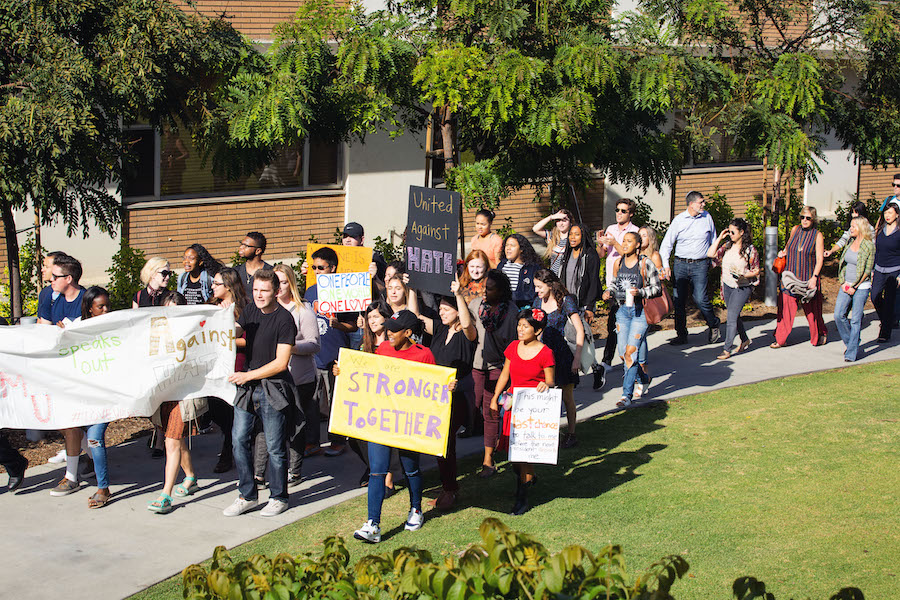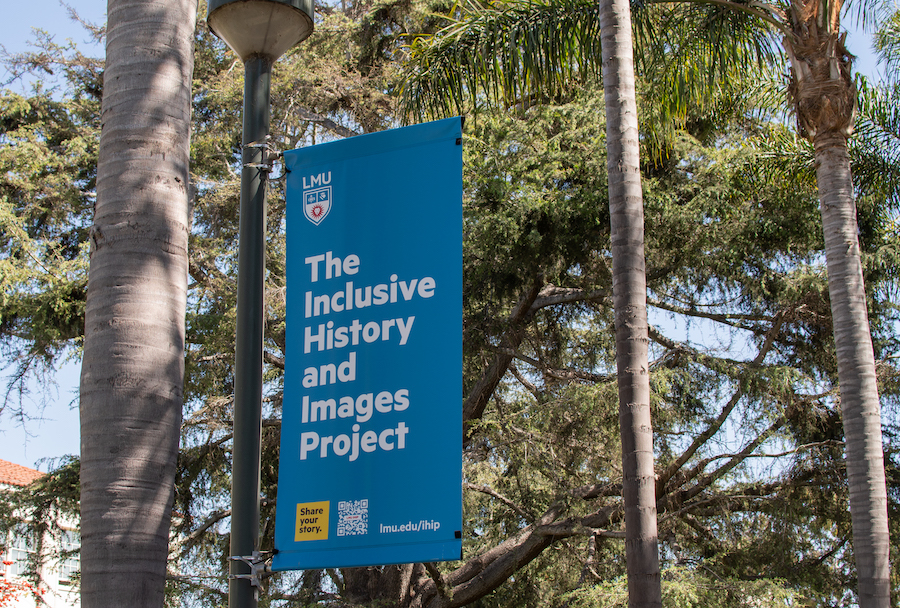IHIP Progress Report
Introduction

From the outset, the goal of the Inclusive History and Images Project (IHIP) was to address important gaps in understanding our own institutional history by gathering stories and images from alumni and the greater Loyola Marymount University (LMU) community from underrepresented backgrounds to tell the full and inclusive LMU story. Over the last year, we have taken many strides in setting up a digital collection that captures images and oral histories of LMU community members from historically marginalized communities across generations. Through funding from NetVUE and the Grace Nixon Foundation, we have built a process to collect and retell the history of LMU through a more inclusive lens.
Photo: Post-election rally against hatred on the LMU campus, November 2016.
IHIP Progress to Date
Since launching the program, the IHIP Committee successfully accomplished the following:
- Formed an official IHIP university steering committee, co-chaired by Chancellor Michael Engh and Dean Bryant Keith Alexander (College of Communication and Fine Arts). The committee consists of key members from across the university in order to facilitate the project. Please read the IHIP Bylaws.
- Under the guidance of staff members from the LMU William H. Hannon Library, (three of whom sit on the IHIP committee) we selected a collection of images telling the stories of underrepresented members of the LMU community. Initially, the digital collection comprised approximately 100 images, and continues to grow. As anticipated, the initial process yielded about 75-80 photographs, a number that reflects the lack of institutional documentation of such communities. Nonetheless, these photos and documents serve as a foundation for the IHIP Digital Collection moving forward with continued discoveries and donations.
- Launched the IHIP Digital Collection, a continually growing, curated collection that currently contains over 150 images. The IHIP Digital Collection is hosted in Hannon Library’s Digital Collections.
- Spearheaded a university-wide campaign in February 2022 that raised awareness throughout the LMU community about IHIP. There were many facets to the campaign including:
- Designed and installed 31 banners across the main campus that drew upon images from the IHIP Digital Collection. The banners underscored the theme of “There’s More to This Story.” These banners were also displayed at the LMU Loyola Law School (LLS) campus. After the month-long campaign, the banners are now displayed in University Hall.
- Produced a video announcing the IHIP project that was part of the digital component of the campaign.
- Created Zoom backgrounds to publicize IHIP during virtual meetings.
- Wrote articles detailing the aims of IHIP and the need to solicit participation from LMU alumni and other community members. Read examples of LMU Newsroom articles from April 5, 2021 and Feb. 28, 2022.
- Designed and installed 31 banners across the main campus that drew upon images from the IHIP Digital Collection. The banners underscored the theme of “There’s More to This Story.” These banners were also displayed at the LMU Loyola Law School (LLS) campus. After the month-long campaign, the banners are now displayed in University Hall.
- Facilitated a Zoom-based community forum in March 2022 for LMU students, faculty, and staff to acquire a broader context about IHIP and address any questions and concerns.
- Conducted thirteen (13) oral history interviews with a range of alumni, faculty, and staff from several historically marginalized communities during the Summer and Fall 2022 semesters. These oral interviews, recorded in the Informational Technology Services (ITS) Creative Studios, broadened our understanding of LMU's rich and diverse history. The recorded interviews are, or will be, openly accessible through the IHIP Digital Collection. We will continue to interview more community members as part of the ongoing project.
- Created an Oral History class through the LMU History Department, taught by Professor Margarita Ochoa. In Fall 2022, three students gained hands-on experience through conducting several oral histories interviews. The course is being offered in the Spring 2023 semester and the following year.
- Set up informational booths at the LMU Alumni BBQ in September 2022 and the LMU Loyola Law School OutLaw 50th Anniversary alumni mixer in October 2022. This provided the opportunity to gather short audio interviews from alumni.

Changing the Narrative

A vital part of IHIP is to the change the narrative of the history of LMU to justly embody the mission of the university – the encouragement of learning, the education of the whole person, and the service of faith and the promotion of justice. By highlighting the visual and narrative history of communities of color who have contributed to the university’s growing commitment to inclusivity, IHIP has indeed begun to change the narrative of the university. Much of the history of diversity, equity, and inclusion at LMU – increasing enrollment of Black and Latino students; the creation of Ethnic Studies departments, Ethnic and Intercultural Services, and other programs and departments; and changing institutional policy for more just outcomes – largely remain passed down orally by key members of the LMU community. Through this project and the launching of the IHIP Digital Collection, we have begun the process of truly archiving and institutionalizing this history.

A key impetus of archiving the experiences of historical marginalized communities at LMU was the urgency of activism of these communities, particularly students, in pushing the university to become a more inclusive and equitable institution. More than just including diverse faces in our collection, the IHIP committee decidedly committed to focus on how student activism reshaped the university throughout its history by collecting oral histories of key alumni and other community members who were front and center in that activism. For example, our oral history interview with long-time staff member Charles Mason revealed a time when the University public safety officers would stop and question African American community members as they entered campus during the 1990s, and how the community pushed the university to establish non-biased guidelines for its security. Likewise, our oral history interview with alumnus Armando Duron chronicled the various sit-in demonstrations Latino students staged during the 1970s to demand more diverse student enrollment and services for their neglected communities. These stories and others clearly demonstrate the important work of documenting the vital role of student activists in remaking the university.
Three photos above show IHIP campaign signage on LMU's campus.
Challenges and Adjustments

While there have been many successes since the launch of IHIP at LMU, the undertaking has not been without challenges. Overall, the IHIP committee continuously evolved as we came upon new issues in executing the project. For example, when we officially launched IHIP during our awareness campaign, some community members questioned aims of the project and asked if we were simply giving lip service to the often-past. However, we addressed many of these concerns by facilitating a community forum to give proper context of the project and receive suggestions.
Additionally, the work of IHIP was accelerated by the hiring of LMU’s new university archivist (Lizeth Zepeda) and digital projects librarian (Neel Agrawal) earlier this year. These roles are vital in advancing the archival initiatives of the project. In particular, we came to understand that the details that go into the process of archiving photos and capturing oral histories were much more nuanced and complex than we anticipated. The level of detail required for creating metadata and transcribing interviews was initially beyond the IHIP committee’s expertise until the library hired their new staff and graciously appointed both to serve on the IHIP committee. While they are coming up to speed on processes and procedures, the proposed book that would accompany the project may take more time than anticipated.
Ultimately, the Inclusive History and Images Project is meeting the intended goal of building an infrastructure to document and archive inclusive histories across the LMU community, through powerful visuals and compelling narratives. Many members of the LMU community – alumni, faculty, staff, and students – are actively involved in the project and have expressed much interest its ongoing success.
Photo: Students on campus, 1971.